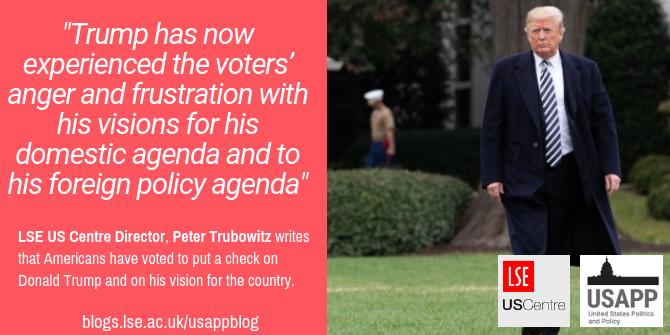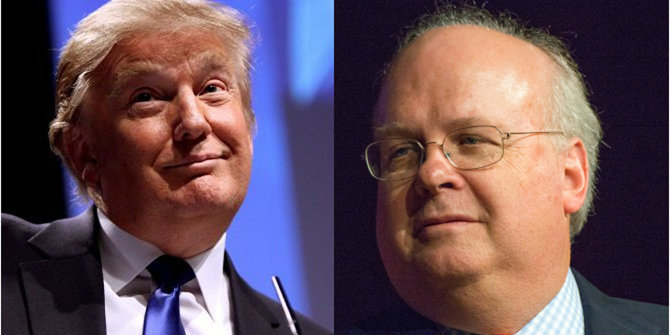 This year’s midterm elections saw the US House of Representatives fall back in to the hands of the Democratic Party. LSE US Centre Director, Peter Trubowitz writes that this election was driven by two very different visions for the country, and that the result has brought Trump down to earth just as other presidents have been in the past.
This year’s midterm elections saw the US House of Representatives fall back in to the hands of the Democratic Party. LSE US Centre Director, Peter Trubowitz writes that this election was driven by two very different visions for the country, and that the result has brought Trump down to earth just as other presidents have been in the past.
Yesterday America voted to put a check on Donald Trump — that’s the bottom line. By giving Democrats the Speaker’s gavel in the House, voters put an end to the Republican rubber stamp and have all but guaranteed that Mr. Trump will face a tough battle-tested opponent in Nancy Pelosi as Speaker. Donald Trump will try to tweet the results away in the days ahead, but yesterday the president was brought down to earth. Indeed, he’s looking pretty ordinary right now — the fourth president in a row to endure a major midterm setback. Bill Clinton lost the House in 1994. George W. Bush did in 2006. Barack Obama did in 2010.
In the days and weeks ahead, we will have a chance to pour over the 2018 midterm election returns and assess what they mean for America and for the world. This much, however, is already clear. The election boiled down to a simple single question: are you more afraid of illegal immigrants crossing the border with Mexico, or Republican threats to take away Obama’s healthcare mandate covering preexisting medical conditions? Republicans ran ads non-stop about the former; Democrats flooded the airwaves with ads about the latter. These issues tap into very different understandings of what troubles America. For white blue-collar Republicans, anxiety about America’s changing cultural identity makes issues like immigration the greatest threat; for Democrats, worries about economic security makes health care the single most important challenge. Yesterday’s exit polls bear this out: health care and immigration top voters’ list of concerns, with Democratic voters stressing health care and Republican voters emphasizing immigration. To be sure, other issues mattered too — the Senate hearings on Brett Kavanaugh for Supreme Court; Trump’s trade war with China; and of course, Donald Trump himself. But when scholars and analysts look back on the 2018 midterm election, they will remember it for what it was: an election driven by two very different visions of what ails America, and how to repair it.

“President Donald J. Trump Departs the South Lawn” by The White House is Public Domain
Trump has now experienced the voters’ anger and frustration with his visions for his domestic agenda and to a lesser extent, his foreign policy agenda. Will this now force Mr. Trump to move to the centre and seek bipartisan cooperation? Yes, on some issues such as Big Pharma (cutting drug prices), infrastructure, and possibly trade, though much will depend on how willing Trump is to align his proposals with Democratic ideas, and whether House Democrats think they are better off “messaging” as opposed to legislating. That said, there are also real limits on how much bipartisan cooperation we will see. As Trump’s strategy in 2016 and again in 2018 indicates, he sees polarizing the electorate as his best play for winning re-election in 2020.
- Some content from this article originally appeared at Chatham House
Please read our comments policy before commenting
Note: This article gives the views of the author, and not the position of USAPP– American Politics and Policy, nor of the London School of Economics.
Shortened URL for this post: http://bit.ly/2PjJSw1
About the author
 Peter Trubowitz – LSE US Centre
Peter Trubowitz – LSE US Centre
Peter Trubowitz is Professor and Head of International Relations, and Director of the LSE’s US Centre. His main research interests are in the fields of international security and comparative foreign policy, with special focus on American grand strategy and foreign policy. He also writes and comments frequently on US party politics and elections and how they shape and are shaped by America’s changing place in the world.






